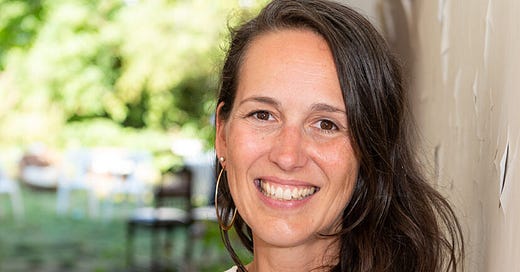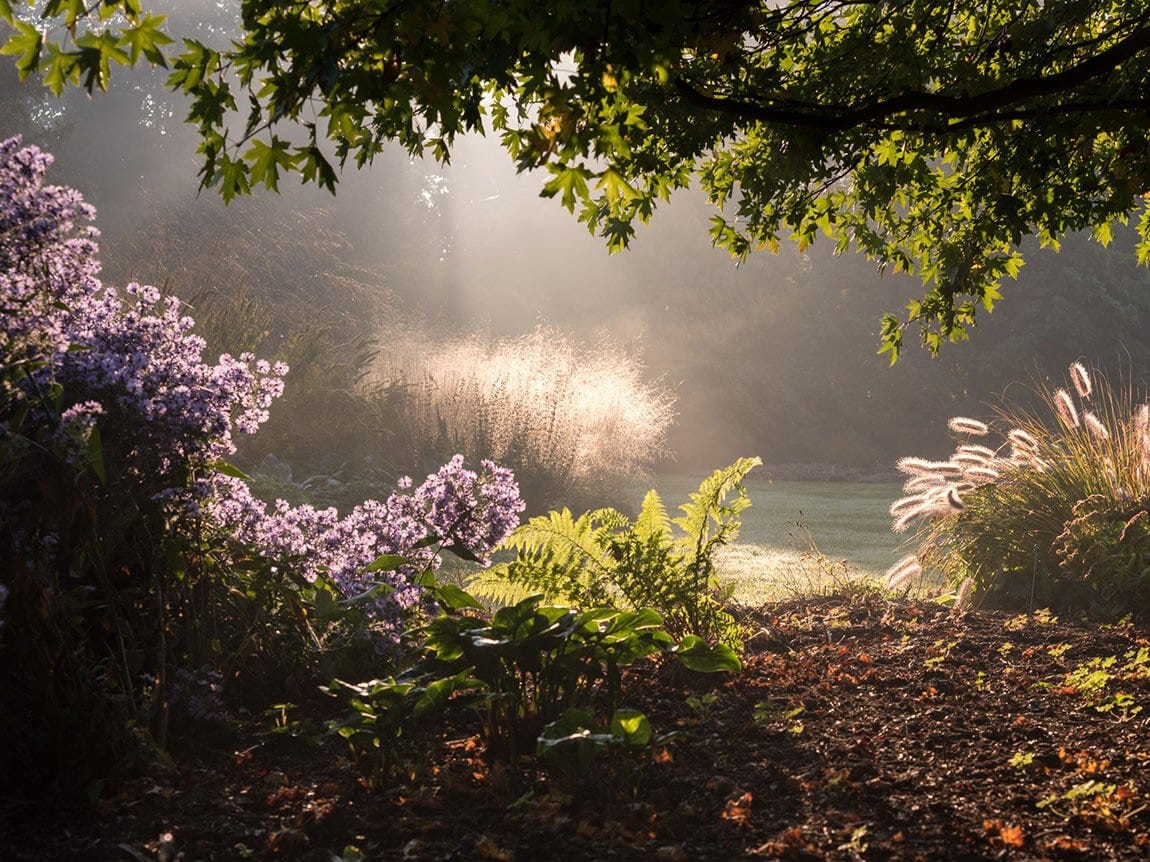Welcome to People Like You, a newsletter that explores the stories, questions, and ideas that help people design a better life.
Today’s edition at a glance:
Vanessa Boel – funeral director and deathworker
On grieving well, and living a good life
Living consciously
A stoic perspective on life and death
Life in bloom
One question for you
Meet Vanessa Boel – funeral director and deathworker - °1978
WHY VANESSA?
Vanessa is a prime example of someone who’s radically flipped the script on her life – and who’s been on a mission ever since. After she was fired from her role as creative manager for a Belgian fashion retailer chain, she made a radical career switch and trained to become a funeral director. She is now changing how Belgians pray goodbye to their loved ones and is innovating one of the most change-resistant industries, one funeral at a time. We had coffee, spaghetti, and a great conversation.
VANESSA, HOW DOES A CREATIVE MANAGER BECOME A FUNERAL DIRECTOR?
I’d been working as a creative and team lead for 20 years, for several fashion retailers, when I was let go, in the middle of the covid pandemic. It wasn’t a big drama for me – I was ready to move on, and it gave me some time and financial freedom to explore options. Through an outplacement office, I found a ‘funeral director’ training – and this led me down a rabbit hole.
The more I learned about the funeral industry, the more I saw how traditional, impersonal and ‘sad’ it was – and at the same time, how it would always be around. People continue to be born, and will continue to die. I had never seen a dead body, and I was not very experienced in grief, but I decided to start an Instagram account - to create awareness around grief, death and alternative ways of organizing funerals. This was still in the pandemic, and a lot of people were confronted with unexpected loss.
I saw an opportunity to do things better – to disrupt an industry. A few months later, I was organizing funerals and farewell rituals myself, under the flag of TRØST - Duurzaam Afscheid – a pun on trust and ‘troost’ (comfort in Dutch)
YOU PRIDE YOURSELF ON HELPING PEOPLE SAY GOODBYE SUSTAINABLY. WHAT DOES THAT MEAN?
I guide people in the whole trajectory of parting. This can start months, or even years, before a death, and lasts until a few weeks after the funeral itself. I have even developed Trøst-kits, which help people have difficult conversations about their own funerals, and I try to give my clients full agency over this process.
I’m mostly there as a facilitator, and I empower families to actively step into the grieving process, so they can make the right decisions for a funeral ceremony accordingly. Sustainable farewells have little to do with ecological concerns, but everything with helping people move towards, through and onwards from the death of a loved one.
WHAT DOES ‘GRIEVING WELL’ LOOK LIKE?
Grief is universal, and highly individual. There are no right, or wrong ways of grieving. There’s no one size fits all, and no step-by-step guide for grief.
A healthy process of grief is often a dual process – one which oscillates between states that help us repair and move on (“what brings me joy?”), and states that focus on the loss (“how do I experience this sadness?”). We shouldn’t feel guilty for spending time in either of these states, and children are naturally very good at this oscillation. They can quickly switch between sadness and play.
Men and women typically grieve differently – men tend to focus on action and goals, and keeping everything going, while seemingly distracting themselves. Women tend to spend more time in the emotional state of loss. But I also see the inverse happening.
Furthermore, grief is not just a mental or emotional process – the process of detaching can be a very physical experience too. Breathwork and somatic work can be hugely beneficial.
What many people don’t know yet is that grief also typically triggers old wounds, and older grief. I’ve learned never to judge people in grief – the process takes as long as it takes – and it will never fully end. But people are immensely resilient, and they’ll find way to deal with it in the end.
SINCE YOU DEAL WITH DEATH ON A DAILY BASIS - HOW HAS THIS WORK AFFECTED YOUR OUTLOOK ON LIFE?
In a nutshell: I live more intensely and I worry less.
For starters, the work has brought me much more peace of mind, and more time. I only work with a select number of families, so I can be fully present for them during the entire process. Obviously, working with families in grief also forces me to see the relativize the smaller day-to-day dramas and mishaps in my life, and I’ve become a much better listener.
I experience life more fully, more mindfully, more peacefully. I’ve learned to let go, to worry less about what others think, and to take a more relaxed, surrendering approach to life, and death. It is what it is.
WHAT ARE YOUR PHILOSOPHIES FOR A GOOD LIFE?
I think the secret is in accepting life’s duality, and its apparent contradictions.
Life and death, fast and slow, letting go and holding on, the many and the ‘few-ness’, happiness and life’s trials. Accepting them all, and letting them co-exist
As contradictory as it seems, I believe life is for those who act swiftly. In my entrepreneurial journey, I’ve learned to take action as soon as I can. And on the other hand, I’ve learned not to rush things, and accept things as they are.
Simultaneously, working with people in grief has taught me kindness and compassion. We can’t judge someone else’s life, and we all deal with our own mess.
Keeping an open mind. BUT ABOVE ALL: LOVE. To love and be loved.
WHAT’S A QUESTION MY READERS SHOULD ASK THEMSELVES MORE OFTEN?
Ask yourself: “Is this a conscious choice?”.
We make so many decisions, and very rarely are they conscious choices. I witness this as a funeral director – people make choices or arrangements because that’s how it’s done, but they rarely stop and dare to question these decisions. I never choose for them, I just help them make decisions that are right for them.
But this applies to all facets of life – including your job, relationships, etcetera. Making conscious choices forces you to question your habits, traditions, the expectations society has, … The upshot: making conscious decisions massively boosts your confidence and self-esteem.
Be proud of your choices, and own them.
MEMENTO MORE - A STOIC WAY OF LIFE (Kris’s thoughts)
Vanessa’s insights reminded me of the Stoic philosophers, in particular Marcus Aurelius, the Roman emperor. In his private journals, now known as his “Meditations” (a fixed feature on my nightstand), he repeatedly mused about the brevity of life, and used it as a guiding principle to live his best life – every day.
“You could leave life right now. Let that determine what you do and say and think.”
A personal reminder, written by the most powerful man of his day, to continue living a life of virtue today, and not wait for circumstances to be ‘right’.
Meditating on our mortality is only depressing if we miss the point. It is a tool to create priority and meaning, on the best of our days, and on the worst of our days.
Further on, he reflects:
“Perfection of character is this: to live each day as if it were your last, without frenzy, without apathy, without pretence.”
In other words: don’t rush, and don’t waste time. Treat time as a gift, and spend it on what matters. Remove distractions from your life and double down on the things that matter.
And a personal favorite:
“Think of the life you have lived until now as over and, as a dead man, see what’s left as a bonus and live it according to Nature. Love the hand that fate deals you and play it as your own, for what could be more fitting?”
In other words – accept that death is part of life, and embrace the ebb and flow of nature’s rhythms. Play the cards you’ve been given, on that day, and play them well. The tables will turn, and you’ll be glad you did.
LIFE IN BLOOM - THE ARBORETUM
The Flemish town I live in is known for its heart of green – its inhabitants are spoiled with a stunning nature reserve, consisting of dramatic sand dunes, heather, fens and woodlands, crisscrossed by endless single tracks. It’s our own private Wuthering Heights.
In the middle of town, however, sits another (and much lesser known) gem: the Arboretum. It’s been here for more than 150 years, and started as a plant nursery, later to be converted into a private and later public botanical garden. It’s now one of the most valuable collections of woody plants in Europe. It boasts sequoias, magnolias, witch hazels, Japanese cherry trees, and pretty much everything in between.
I started volunteering here as a gardener, amid this winter’s long dark night of the soul. It seemed like a sensible move to keep me grounded (literally), to keep moving, to get the cortisol out of my system, and grapple at a sense of purpose (and learn a thing or two about plants, and life, as it turned out).
Every week, I’d be pruning trees, cutting bamboo and weaving fences, and mulching the borders – while sporting headphones that blared out podcasts, in a failing attempt to cancel out the intrusive thoughts and the perfect storm in my head. It was not fun. At all.
We’re three months later, and the intrusive thoughts have stopped. The fog has lifted, the cortisol is in check again, and the corners of my mouth are pointing skyward again. And yesterday, I visited the Arboretum again, as a visitor. I brought my copy of Marcus Aurelius’ Meditations. And boy, was he right.
The garden is in bloom these days – an explosion of pastel colors. And for the first time I saw the blossoms. On the same dreary, leafless cherry trees I’d gotten familiar with during the darkest days of the year. The hyacinths and violets emerging from the mulch I’d spread out. The fragrant magnolias welcoming spring (and Easter bunnies).
And I understood: nature moves on. Whether we want it or not. Life marches on, in an endless cycle of ebb and flow, of giving and taking.
From everything that dies, springs forth a new blossom. All we can do, on any given day, is play the hand we’ve been dealt and play it well. And trust that like hyacinths and photographs, character develops in darkness.
ONE QUESTION FOR YOU:
Think of an area of your life that is currently not in bloom.
=> What’s the smallest change you can make today that will pay out dividends in the future?
What seeds can you sow, which plant should you water, which branches need pruning?
PS: WHO SHOULD I INTERVIEW NEXT?
Do you know someone who’s radically flipped the script on their lives?
Or have you done so yourself? Drop me a line or a comment below, and I’ll be in touch!
Happy Easter, everyone.
May you be well.
🙏Kris








